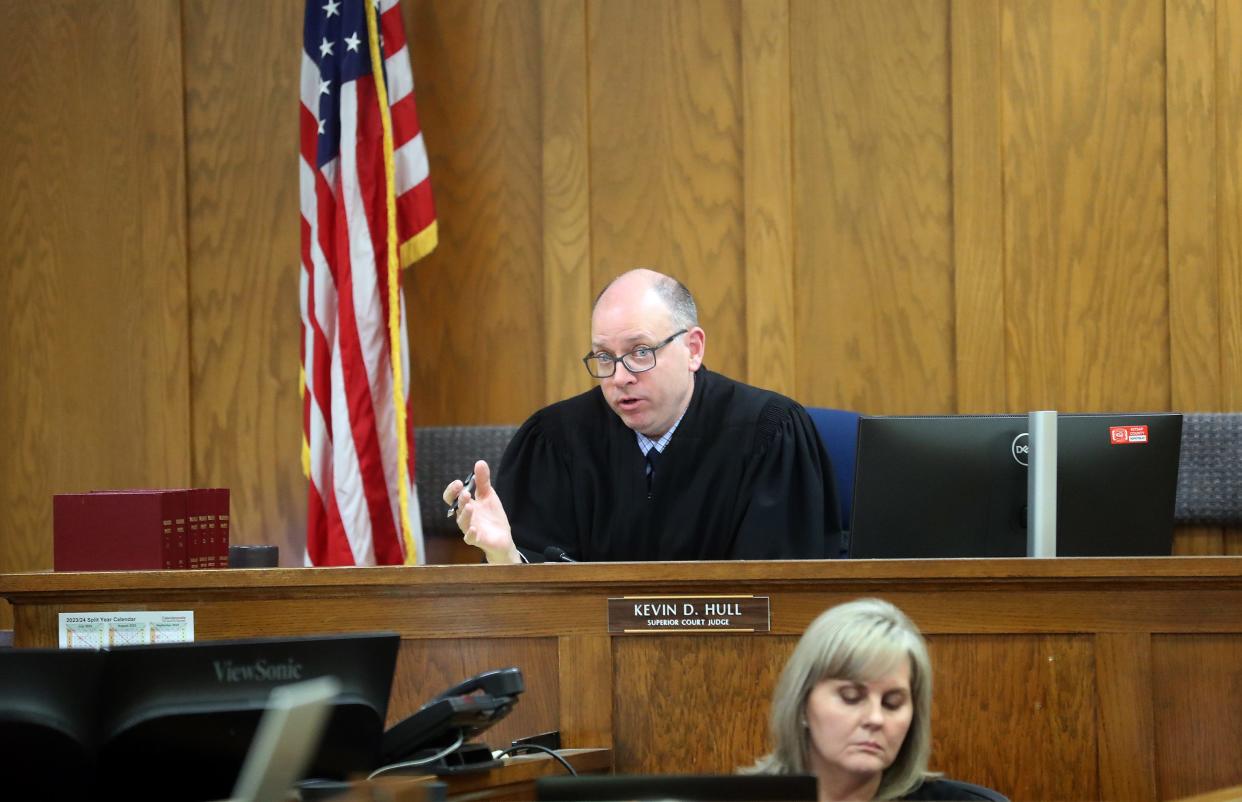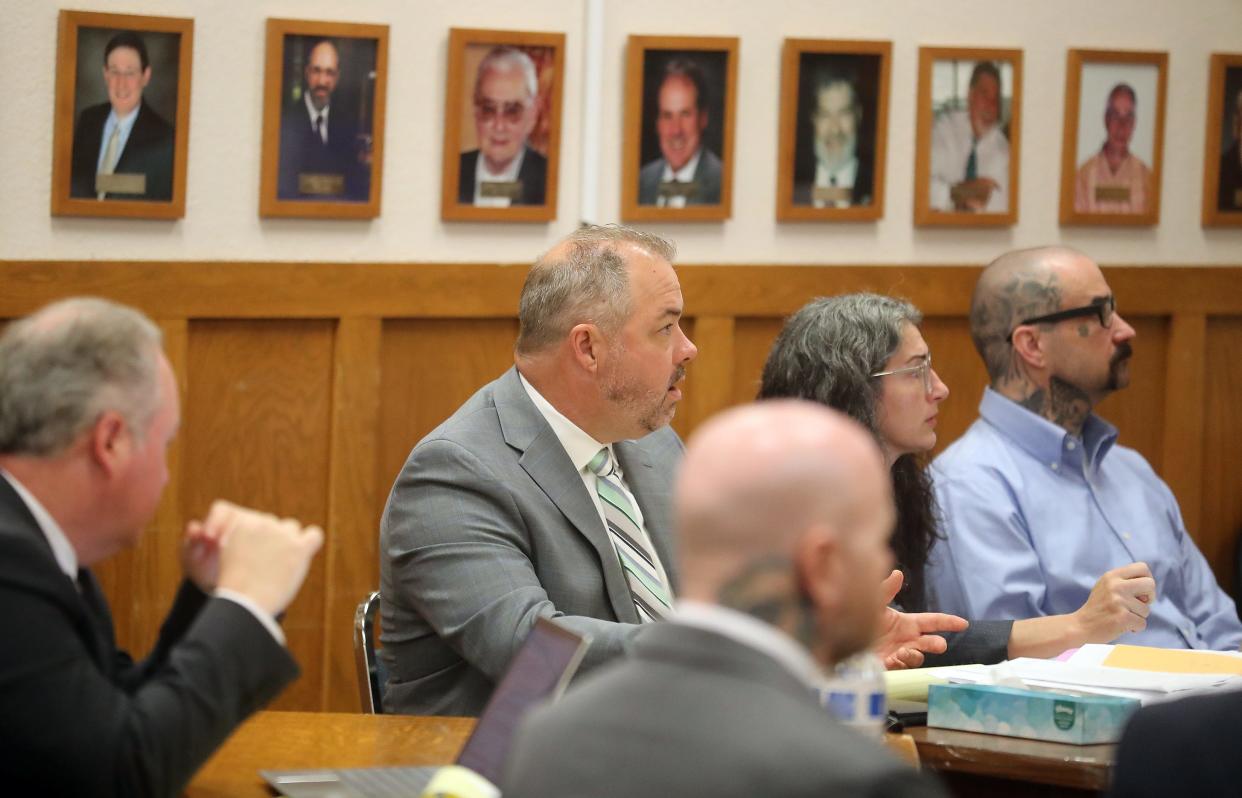Jury will decide Careaga murder trial soon as arguments wind down in Kitsap Superior Court
PORT ORCHARD – Closing arguments wrapped up this week in the four-month-long murder trial of three men accused in the killing of John Careaga and three members of his blended family in the greater Seabeck area in 2017.
Investigators linked the murders to drugs and money connected to the family that resulted in the killing of Christale Careaga and two teenagers, Hunter Schaap and Johnathon Higgins. They were shot execution-style in the family’s home, which was set on fire, while Careaga was found shot and burned in his truck on a tree farm in Mason County two days later.
Danie Kelly, Robert Watson III, both members of the Bandidos Motorcycle Club, and brother Jonathan Watson sat before a Kitsap Superior Court room presided over by Judge Kevin Hull this week to hear attorneys for either side make a final case before jurors. The three were arrested in 2022 and held without bail in the Kitsap County Jail.
On Monday attorney Phil Bacus reiterated the main points made by the Kitsap County Prosecutor's Office throughout the trial proceedings. Over five hours, Bacus argued that the three defendants had planned out and executed the homicides with the intent to steal John Careaga’s money, stocks of cocaine and destroy all evidence of the crime, including killing any witnesses.

“How do we know they did it and did it together? Because in the business of murder, everyone has a job,” Bacus told the courtroom.
Bacus brought the alibis of Robert Watson III and Danie Kelly into question and took the jury through data that tracked the alleged whereabouts of their cell phones and a prepaid Tracfone purchased by Kelly prior to the Careaga family’s murder. Bacus went on to highlight connections between the case’s cast of characters and discussed the alleged motivations they had that resulted in the horrific quadruple homicide.
“This case is about connections and broken connections, the ties that bind people together,” Bacus said. “Connections of family, friends, brothers, business, community: they can be strong and enduring… The evidence has shown in this case, beyond a reasonable doubt, that these broken connections set the stage for these murders by these defendants.”
Bacus addressed the jury, imploring them to find all three defendants guilty on all counts.
“We've given you a theory, how we think it all fits together. You don't have to agree with that theory. If you believe that the elements have been proven beyond a reasonable doubt, but you disagree with the theory, it's your responsibility to find the defendant guilty because we've proven the elements.”
Defense attorneys for the three men went on to cast doubt on physical evidence, the credibility of key witnesses and the timeline strung together by prosecutors.
More: Background on the Careaga quadruple homicide trial in Kitsap County Superior Court
“The state largely ignored the physical evidence and presented a theory that ignored physical evidence,” said Robert Watson III’s attorney, John Cyr, who on Tuesday cited the fact that DNA testing excluded his client and the other two defendants from connection to items discovered at the various crime scenes, such as rocks used to smash windows and vent the fire, a broken alarm panel and car keys.
“This investigation from the beginning was conclusion first,” Cyr said, arguing that the state’s case was following a narrative that preceded concrete evidence. “None of the witnesses have first-hand knowledge of the murders.”
Attorney Tom Weaver, representing Danie Kelly, argued for the legitimacy of his client’s alibi with cell phone tower data, Kelly’s Facebook messages on the night of the murders and a drug deal, refuting the possibility that Kelly could have made it to the Careaga residence and commit the crime in a short time gap in his alibi.

“The time doesn’t work, the geography doesn't work and the math doesn’t work,” Weaver said on Wednesday.
Attorney Craig Kibbe, representing Johnny Watson, argued that even within the speculative evidence presented by county prosecutors, “less than 5%” applied to his client.
“This case has almost nothing to do with Johnny Watson in dozens of witnesses, close to 2,000 exhibits, he was clearly an afterthought in relation to the other two defendants,” Kibbe said.
Kitsap County prosecutors are scheduled to offer a final rebuttal for jurors on Thursday, before the case is turned over to the jury by Judge Hull.
This article originally appeared on Kitsap Sun: Closing arguments in five-month Careaga murder trial near completion
